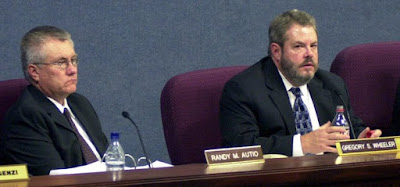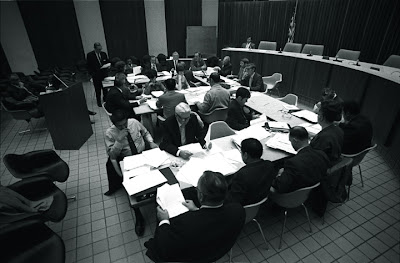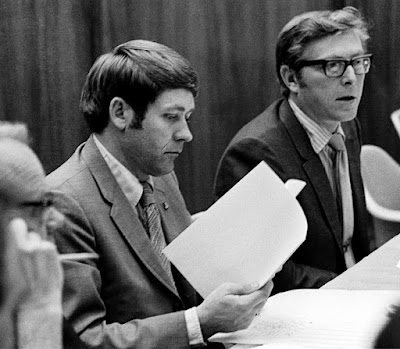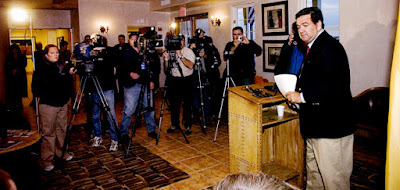 This is Mei Sheng, a resident of the San Diego Zoo. He is the Giant Panda that Mayor Martin Chávez has always had his eye on to bring to Albuquerque. Chávez promised in his 2006 state of the city address, that the Rio Grande Zoo would be home to Pandas, plural, by the end of the year.
This is Mei Sheng, a resident of the San Diego Zoo. He is the Giant Panda that Mayor Martin Chávez has always had his eye on to bring to Albuquerque. Chávez promised in his 2006 state of the city address, that the Rio Grande Zoo would be home to Pandas, plural, by the end of the year. Chávez announced his candidacy for the Democrat Party’s primary nomination for the U.S. Senate seat being vacated by Sen. Pete Domenici, Oct. 9.
Chávez announced his candidacy for the Democrat Party’s primary nomination for the U.S. Senate seat being vacated by Sen. Pete Domenici, Oct. 9.His run raises its own questions. A couple of city attorneys, both of whom serve at the pleasure of the mayor, have waded in, attempting to answer some of those questions.
While Chávez runs for senate, the business of the City would be managed by Chief Administrative Officer Bruce Perlman, below, City Attorney Bob White told Albuquerque Tribune’s city hall reporter Erik Siemers.

Chávez claimed he could make decisions and govern, while campaigning around the state, including using BlackBerry technology.
http://www.abqtrib.com/news/2007/oct/10/chavez-juggling-duties-run-senate/
 If elected, the president of the Council would become the mayor pro-tem, said Deputy City Attorney and Acting City Clerk Randy Autio, left, seen here with fellow Assistant City Attorney Greg Wheeler during the Don Harris Ethics Board Hearing. The then mayor pro-tem would get to replace their seat to fill their unexpired term or until the next regular election.
If elected, the president of the Council would become the mayor pro-tem, said Deputy City Attorney and Acting City Clerk Randy Autio, left, seen here with fellow Assistant City Attorney Greg Wheeler during the Don Harris Ethics Board Hearing. The then mayor pro-tem would get to replace their seat to fill their unexpired term or until the next regular election. So, should Chávez be elected, he would take office in Jan. 2009 and the president of the Council, elected at the first meeting of Dec. 2008, would become the mayor pro-tem. Contrary to the public discussion that is now taking place, it is not the next council president’s election that counts, but the following one.
So, should Chávez be elected, he would take office in Jan. 2009 and the president of the Council, elected at the first meeting of Dec. 2008, would become the mayor pro-tem. Contrary to the public discussion that is now taking place, it is not the next council president’s election that counts, but the following one.I don’t usually respond to anonymous comments, especially from someone else’s blog. Because of the openness of this new medium where everyone has the same voice, it is necessary to not give credence to inaccuracies.
“Read the city charter, he can't run again,” an anonymous commenter wrote on the Eye on Albuquerque blog, about Chávez’ announcement for senate. “The charter only allows for two consecutive terms. Now if he challenged this it probably would not stand up in court, but by the time the senate election is over it will be too late for him to challenge the city charter.”
“I've read the charter, there's no mention of the mayor being restricted to two terms...only councilors...better to be prepared than to assume he's out,” a counter anonymous commenter wrote.
Let’s look at the Charter; it’s the equivalent of the federal or state constitutions. It’s the people’s grant of power to form a city government.
 Here is the Charter Revision Commission, above, during a mid Feb. 1971, work session.
Here is the Charter Revision Commission, above, during a mid Feb. 1971, work session. The Commission was Chaired by: the former President of the City Commission, Ex-officio Mayor and the just defeated Republican gubernatorial candidate, Pete Domenici, right. He would go on the next year to be elected to the U.S. Senate and re-elected five times.
The Commission was Chaired by: the former President of the City Commission, Ex-officio Mayor and the just defeated Republican gubernatorial candidate, Pete Domenici, right. He would go on the next year to be elected to the U.S. Senate and re-elected five times.In a special election, on June 29, 1971, the people of Albuquerque adopted this Charter.
The preamble says, “We, the people of the City of Albuquerque, under the law of the State of New Mexico, do ordain and establish this form of government for the City of Albuquerque, New Mexico.”
Article five is about the Mayor; section two establishes the term and salary:
“The term of Mayor, unless sooner recalled or removed, shall begin on December 1st of the year of election and shall be for four years or until a successor is duly elected and qualified; after having served two consecutive terms, the incumbent Mayor shall be ineligible to hold office for four years thereafter.”
So, the Mayor is term limited.
Section three is about the Mayor's powers; performance; appointments:
“The executive branch of the city government is created. The office of Mayor is created. The Mayor shall control and direct the executive branch. The Mayor is authorized to delegate executive and administrative power within the executive branch. The Mayor shall be the chief executive officer with all executive and administrative powers of the city and the official head of the city for all ceremonial purposes. The Mayor shall devote full time and attention to the performance of the duties of office and shall hold no other paid public or private employment.”
Section four is about the duties of the mayor:
“The Mayor shall:
(j) Faithfully execute and comply with all laws, ordinances, regulations and resolutions of the city and all laws of the State of New Mexico and the United States of America which apply to the city.”
The importance of the Charter language is that it’s what the people wrote and what they expect of their government. It is binding on those in government.
Chávez has sworn to uphold the Charter three times and well knows its contents.
The crucial words are, “The Mayor shall devote full time and attention to the performance of the duties of office and shall hold no other paid public or private employment.”
Unlike other charters and constitutions that don’t have such precise language, these words mean what they say. Further, the city Personnel Rules and Regulations make provisions for employees who wish to seek elected office. Employees may be granted a leave of absence of up to a year, to run for office. They may not take time off piecemeal, once a worker announces for office; they may not work for the city. If they lose, they may return to work.
The Mayor is the only full-time elected city official paid by tax dollars.
 Gov. Bill Richardson, above, has taken an extraordinary amount of time from his office. The Governor's activities have ranged from making an announcement to the press upon returning from Darfur where he brokered a cease fire-deal, to seeking the Democrat Party's presidential nomination. The State Constitution, article five, section seven states:
Gov. Bill Richardson, above, has taken an extraordinary amount of time from his office. The Governor's activities have ranged from making an announcement to the press upon returning from Darfur where he brokered a cease fire-deal, to seeking the Democrat Party's presidential nomination. The State Constitution, article five, section seven states:“In case the governor is absent from the state, or is for any reason unable to perform his duties, the lieutenant governor shall act as governor, with all the powers, duties and emoluments of that office until such disability be removed.”
There is a difference; the Governor is protected by a line of succession and has no written duty to devote his full time and attention to his office.
 Lt. Gov. Diane Denish, seen here on last years’ campaign trail with her boss, Gov. Richardson, has to be well appreciated for taking care of his duties while he’s out running.
Lt. Gov. Diane Denish, seen here on last years’ campaign trail with her boss, Gov. Richardson, has to be well appreciated for taking care of his duties while he’s out running.Albuquerque has no deputy mayor. Under the Charter the CAO has hands-on duties to run the city on a day-to-day basis. The CAO has specific duties, but does not substitute for the mayor in the mayor's absence.
"My pledge is to work tirelessly and endlessly, to get up earlier, to work harder and go to bed later than anybody else campaigning for this seat," Albuquerque Journal’s political writer Jeff Jones quoted Chávez as saying at his announcement for the senate.
http://www.abqjournal.com/news/metro/601142metro10-10-07.htm
In order to fulfill that pledge, he has to violate the mayoral oath to uphold the city's Charter. He may not do both. The mayor has a choice to make; either he may serve as mayor or he may run for the senate. He may not have it both ways.
So what’s wrong with this picture?
 Ten years ago, Chávez, seen here with his then wife Margaret Aragón de Chávez, nearing the end of his first term, announced that he would not run for re-election. Instead, he would wait a year to run for governor. He lost and returned to city politics running for and being elected mayor in 2002 and being re-elected in 2006.
Ten years ago, Chávez, seen here with his then wife Margaret Aragón de Chávez, nearing the end of his first term, announced that he would not run for re-election. Instead, he would wait a year to run for governor. He lost and returned to city politics running for and being elected mayor in 2002 and being re-elected in 2006.There are those who will argue at every turn as to why the simple words should be interpreted to allow the mayor to run for senate while retaining his office. If he leaves the city to run, he is still being paid by the city. The admonition is not so much about his being paid, but that he is not to be distracted or to leave the city to campaign. He may not take vacation or “leave without pay” to run. He must stay home. He is paid to think about the city, not the Senate.
“Not everything is black and white,” echoes in my ear. I have heard that before about interpretations.There’s some truth to that.
“The Mayor shall devote full time and attention to the performance of the duties of office…” is not subject to such interpretation.
Now, Mei Sheng is black and white. Not in Albuquerque!
1 comment:
Which Council President could become Mayor Pro-Tem is dependent on when Marty would leave office should he be elected to the U S Senate. There is no requirement that Marty wait unitl January 09 to resign. He could resign prior to December 1, 2008 in which case the Council President elected this December would become Mayor. Why would he do this? Maybe as a gesture to friend and supporter Ken Sanchez should Sanchez succeed in getting himself elected Council President this year.
Post a Comment